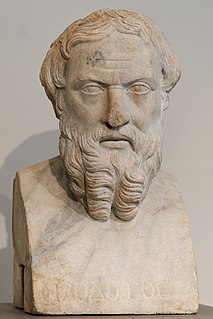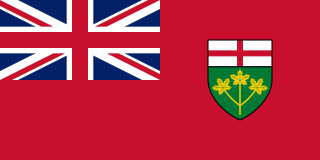Peter Busby Waite, OC FRSC (born 1922) is a Canadian historian, and a retired Dalhousie University professor.

The Order of Canada is a Canadian national order and the second highest honour for merit in the system of orders, decorations, and medals of Canada. It comes second only to membership in the Order of Merit, which is the personal gift of Canada's monarch.
Fellowship of the Royal Society of Canada (FRSC) is an award granted to individuals that the Royal Society of Canada judges to have "made remarkable contributions in the arts, the humanities and the sciences, as well as in Canadian public life".

A historian is a person who studies and writes about the past, and is regarded as an authority on it. Historians are concerned with the continuous, methodical narrative and research of past events as relating to the human race; as well as the study of all history in time. If the individual is concerned with events preceding written history, the individual is a historian of prehistory. Some historians are recognized by publications or training and experience. "Historian" became a professional occupation in the late nineteenth century as research universities were emerging in Germany and elsewhere.
Born in Toronto, Ontario, he attended high school in Saint John, New Brunswick. He obtained B.A. and M.A. degrees from the University of British Columbia, and a PhD degree from the University of Toronto. He served with the Royal Canadian Navy during World War II, attaining the rank of Lieutenant. [1]

Toronto is the provincial capital of Ontario and the most populous city in Canada, with a population of 2,731,571 in 2016. Current to 2016, the Toronto census metropolitan area (CMA), of which the majority is within the Greater Toronto Area (GTA), held a population of 5,928,040, making it Canada's most populous CMA. Toronto is the anchor of an urban agglomeration, known as the Golden Horseshoe in Southern Ontario, located on the northwestern shore of Lake Ontario. A global city, Toronto is a centre of business, finance, arts, and culture, and is recognized as one of the most multicultural and cosmopolitan cities in the world.

Ontario is one of the 13 provinces and territories of Canada and is located in east-central Canada. It is Canada's most populous province accounting for 38.3 percent of the country's population, and is the second-largest province in total area. Ontario is fourth-largest jurisdiction in total area when the territories of the Northwest Territories and Nunavut are included. It is home to the nation's capital city, Ottawa, and the nation's most populous city, Toronto, which is also Ontario's provincial capital.

Saint John is the coastal port city of the Bay of Fundy in the Canadian province of New Brunswick. The port is Canada’s third largest port by tonnage with a cargo base that includes dry and liquid bulk, break bulk, containers, and cruise. In 2016, after more than 40 years of population decline, the city became the second most populous city in the province for the first time, with a population of 67,575 over an area of 315.82 square kilometres (121.94 sq mi). Greater Saint John covers a land area of 3,362.95 square kilometres (1,298.44 sq mi) across the Caledonia Highlands, with a population of 126,202. After the partitioning of the colony of Nova Scotia in 1784, the new colony of New Brunswick was thought to be named 'New Ireland' with the capital to be in Saint John before being vetoed by Britain's King George III. Saint John is the oldest incorporated city in Canada. During the reign of George III, the municipality was created by royal charter in 1785.
Popularly known as P.B. Waite, Dr. Waite began his association in 1951 with Dalhousie University in Halifax, Nova Scotia. He taught at Dalhousie first as a lecturer in history (1951 - 55), then assistant professor (1955 - 1960) and finally Thomas McCulloch Professor of History from 1960 until his retirement. He is currently a professor emeritus and lives in Halifax.

Dalhousie University is a public research university in Nova Scotia, Canada, with three campuses in Halifax, a fourth in Bible Hill, and medical teaching facilities in Saint John, New Brunswick. Dalhousie offers more than 4,000 courses, and 180 degree programs in twelve undergraduate, graduate, and professional faculties. The university is a member of the U15, a group of research-intensive universities in Canada.
Waite is an elegant writer, known especially for his analysis of the events leading to Confederation and the subsequent 30 years from 1867 to 1896. His Arduous Destiny, a history of Canada from 1874 to 1896, was part of The Canadian Centenary Series, a multi-volume project which was commissioned for the centenary of Canadian Confederation in 1967.
A confederation is a union of sovereign states, united for purposes of common action often in relation to other states. Usually created by a treaty, confederations of states tend to be established for dealing with critical issues, such as defense, foreign relations, internal trade or currency, with the general government being required to provide support for all its members. Confederalism represents a main form of inter-governmentalism, this being defined as any form of interaction between states which takes place on the basis of sovereign independence or government.
He has published biographies of three Conservative Canadian Prime Ministers (Macdonald, Thompson, Bennett). His 1985 biography of Sir John Sparrow David Thompson, some ten years in the making, remains a thorough and fundamental resource on Thompson.

Sir John Sparrow David Thompson was a Canadian lawyer, judge, and politician who served as the fourth prime minister of Canada, in office from 1892 until his death. He had previously been premier of Nova Scotia for a brief period in 1882.
He was made an Officer of the Order of Canada on October 27, 1993. [2]






